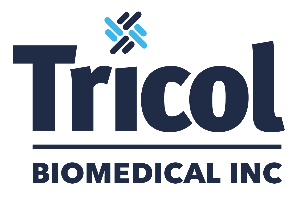Preclinical Evaluation of Tricol Biomedical’s Absorbable Biocompatible Chitosan (ABC) Wound Dressing Demonstrates Bioabsorption and Biocompatability in Internal Bleeding
The poster presentation at the Military Health System Research Symposium investigated the use of the ABC compound in an animal study.
[September 29, 2022: Portland, OR] A preclinical study presented at the Military Health System Research Symposium (MHSRS) this month demonstrated that the proprietary† Absorbable Biocompatible Chitosan (ABC) investigational product from Tricol Biomedical is both absorbable and biocompatible in an internal bleeding rodent model.
The poster presentation, Development of Bioabsorbable Chitosan Hemostatic Wound Dressing by Hua Xie and others, investigated the bioabsorption kinetics and biocompatibility of the ABC dressing when placed intraperitoneally on an injured liver lobe and subcutaneously in 16 animal subjects.
The authors describe the evaluation: “Exsanguinating hemorrhage is the leading cause of death of soldier in wartime and the second leading cause of death in civilian traumatic injuries. Quickly accessing and stabilizing the wound with effective hemostatic techniques is the key for life saving in these events. Historically, HemCon® chitosan hemostatic dressings (composed of chitosan with degree of deacetylation above 78 percent that is not readily bioabsorbable) were developed to address severe hemorrhage for external applications. In this study an absorbable, biocompatible chitosan (ABC) is prepared with a lower and narrow range of degree of deacetylation to provide a chitosan dressing material with good hemostatic properties that bioabsorbs without biodegradation induced fragmentation, and without adverse cytokine mediated inflammatory responses. The open structure, freeze dried porous matrix ABC dressing of the study is designed to facilitate biodegradation by providing enhanced cellular infiltration and proliferation.”
The results of the preclinical study demonstrated:
- Desirable bioabsorption properties and biocompatibility of the ABC dressing in both subcutaneous and intraperitoneal implantation models.
- The ABC dressing implant was 85% absorbed in 28 days and close to fully absorbed within 60 to 90 days at both implantation sites.
- The ABC chitosan dressing demonstrates absorbable biocompatibility without systemic or local adverse responses.
- The ABC chitosan dressing does not result in surgical adhesion formation greater than Grade 2 – no surgical adhesions were observed.
“The proof of principle within this preclinical study demonstrates a significant potential to address internal bleeding with our mucoadhesive controlled dissolution product line,” commented Christopher Rowland, Tricol’s President and CEO. “Tricol has a long history of innovation and is committed to further progressing technologies that cut across hospital call points, procedures, and specialties to significantly benefit the health of patients around the world.”
For more than 20 years, Tricol has been a world leader in advanced acute wound care innovation and is dedicated to expanding technologies, platforms, and applications to improve and save lives around the globe. Through strong scientific background, a highly skilled team and significant emphasis on research and development, Tricol has established itself as a global medical products company that continues to innovate its initial foundation of advanced hemostatic solutions. The company holds over 60 patents and 32 clinical publications, manufacturing life-saving Chito+™ hemostatic product families like HemCon® and OneStop®.
opens in a new windowView Posteropens PDF file
† Protected by US 9547011; US 9846163; US9925310; US 10709817; CZ 3003026; DE 602014050166.4; CN105142399
